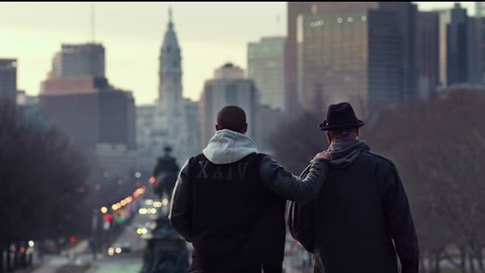
The prospect of the long-hiatus-sequel or the franchise reboot usually indicates how big studios are largely out of ideas. When those two trends are combined, it's doubly a cause for concern. However, amdist the messy Spider-men and legacies of Tron, the needle in the haystack is sometimes found. In Ryan Coogler's Creed, which resurrects the Rocky franchise while installing a dynamic new lead, there's no whiff of crass opportunism or nostalgic exploitation. Instead, there's the real sense of a story worth telling about characters that required either an introduction or a new chapter.
Coogler's film opens on Adonis Williams as a child, fighting amongst his peers in an LA youth facility. Between foster homes, young Adonis is visited by Mary Anne Creed (Phylicia Rashad), widow of heavyweight champ Apollo Creed. She feels obligated to take Adonis in, as he is the child of Apollo's mistress. Flash forward several years, and the now-adult Adonis (Michael B. Jordan) still uses his non-famous surname to fight in underground Mexican bouts. Ready to become a professional boxer, the LA trainers won't take him due to his high economic status and his adoptive mother hates the idea after witnessing what the sport did to her husband. With no one to train him, Adonis heads to Philadelphia to find Rocky Balboa (Sylvester Stallone) and hopefully learn from his father's old friend.
Once in Philadelphia, Creed becomes a more recognizable film, adhering to a sports-movie structure, albeit one with exceptional characterization. Training, small match, bit of fame, big match announced, more training, big match. Coogler hits the plot beats, updating the formula that the original Rocky film helped cement in pop culture, but with eye-catching photography and a thrilling score that retains the iconic Gonna Fly Now frame while adding new beats and rhythms. Creed contains several impressive shots, including a centerpiece one that captures an entire fight in one take, flitting around the ring and capturing all the action from beginning to end. A later single shot follows Adonis and his entourage as they make a long walk through the bowels of an arena, seemingly extraneous but worth it for the anticipation it builds and as a symbol of the characters' journeys. Adonis's status as a light heavyweight means that the viewer is treated to faster choreography than the lumbering heavyweights of every previous Rocky incarnation, so more punches are thrown and there's more emphasis on athleticism than sheer strength. The inherent cinematic quality of boxing applies to training scenes, too, and boxing montages are my favorite kind in the world of sports. In keeping with the body horror aspect of the franchise, Creed also never forgets how bloody boxing is, as burst blood vessels in eyes accompany characters or outright puddles of bloody spit adorn the ring.
In between those plot beats, it is a pleasure to indulge in the laconic scenes Coogler gives the characters. Jordan and Stallone share a playful back-and-forth in more avuncular scenes and an honest pathos in more emotional scenes. Tessa Thompson plays Bianca, Adonis's version of Adrian and a singer on the upswing of her career. Where Adrian was a mousy and beaten-down woman who mostly served as support for Rocky, Bianca could warrant her own film. A musician gradually losing her hearing, she serves as a mirror to Adonis, who is also attempting to fit a career into a slowly-closing window. Thompson and Jordan have a sultry chemistry between them that considerably brightens the film. In the background, Adonis's two eventual opponents and the personnel around them are given appropriate shading, as enough information is doled out to make them recognizable instead of just faceless obstacles to be tackled. Coogler and co-writer Aaron Covington leave no corner of the world unexamined, and their film is richer for it.
Creed features a star-making performance from Jordan, just as the original Rocky did for Stallone. Jordan makes Adonis into a complete person, stubborn but vulnerable, angry but tender, intense but charismatic. Even with 3% body fat and a boxer's physique, he has never lost the innocence in his eyes that marked his tragic character on the Wire, and he brings it out here to great effect. Credible as a romantic lead and in the ring, Jordan easily anchors the film and makes the possibility of future sequels a fait accompli. As the elderly Rocky, Stallone surprisingly shares Jordan's vulnerability. Everyone around him has died or dropped out of contact with him, and his loneliness in a city where he's on a first-name basis with strangers is deeply painful. Until Adonis arrives, and for some time after, all that's left for him is marking time until something stops working. Thompson, already on my radar after her strong turn in Dear White People, is enthralling, with her thoughts dancing across her eyes as she decides how deep to dive in with Adonis. Lastly, Rashad is a capable moral center who makes a meal of her too-few scenes. Providing true and lived-in reasons why Adonis should not follow in his father's footsteps, she has a wise and earned clarity, but also understands how hard to push and when to surrender. Coogler treats her with eminent fairness, despite the character's wish that the events of the film never happen.
Creed rockets up the list of favorite sports films, bringing a shocking amount of life to a franchise that is entering its fifth decade. It nails the euphoria that competition so often traffics in, guided along by a passionate performance from Jordan and a cautiously optimistic one from Stallone. With this and his debut of Fruitvale Station, Coogler deserves to be on the short list of young directors, and after two superlative outings, may well find himself in the auteur pantheon. Creed is a film that works, succeeding in every aspect and never indulging in a false moment amidst a genre that is hip-deep in them. A-
 RSS Feed
RSS Feed